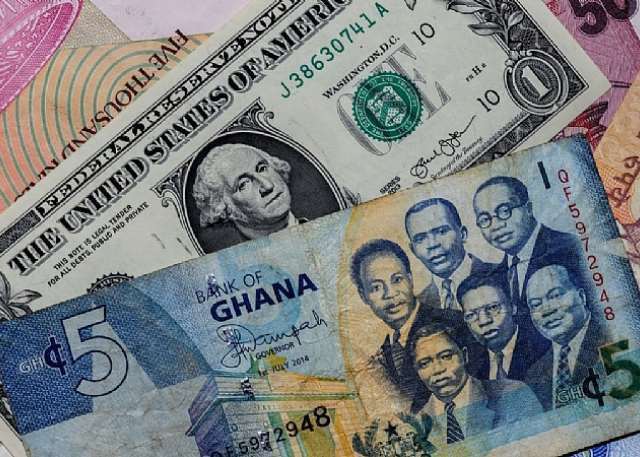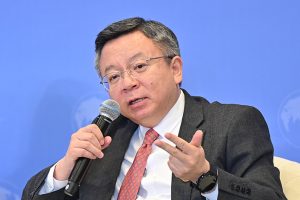“We Told You So” – IERPP Teases Gov’t Following IMF’s Caution on Cedi Management

The Institute for Economic Research and Policy Promotion (IERPP) is saying “we told you so,” pointing to the International Monetary Fund’s (IMF) recent concerns about how government is managing the cedi’s stability.
In its fourth review under the Extended Credit Facility Arrangement with Ghana, the IMF Executive Board expressed worry about the government’s ongoing efforts to prop up the cedi through direct foreign exchange (FX) interventions, instead of letting market forces determine its real value. “The Bank of Ghana should maintain an appropriately tight monetary stance until inflation returns to its target, reduce its footprint in the foreign exchange market, and allow for greater exchange rate flexibility, including by adopting a formal internal FX intervention policy framework,” the IMF stated plainly.
The IERPP, in a statement signed by its Executive Director, Professor Isaac Boadi (who also heads the Faculty of Accounting and Finance at UPSA), noted that it had issued similar warnings to the government previously, but those cautions went unheard. “These warnings from the IMF do not merely validate, but vindicate the concerns that the Institute for Economic Research and Policy Promotion (IERPP) raised earlier,” the statement read, with a clear tone of satisfaction. The IERPP went on to accuse the government of intentionally injecting large amounts of dollars into the market to artificially inflate the cedi’s value.
Related Articles
Gov’t Committed to Current IMF Program, No Renegotiation Planned – Finance Minister
Cedi Gaining Momentum On Global Market & Issues Arising
“While this may create an illusion of short-term stability, it distorts market dynamics, encourages cheap imports, and undermines local production, a toxic combination for long-term economic health,” the Institute warned sharply. It further criticized the Bank of Ghana (BoG) for not having a transparent foreign exchange intervention policy. “To date, the BoG has not adopted a clear, published FX intervention framework. Its market operations remain ad hoc and opaque, leading to uncertainty and speculation,” the statement said. “Instead of allowing the exchange rate to reflect actual market forces, the BoG has continued aggressive dollar sales, especially during politically sensitive periods.
This short-term approach masks deeper structural issues, exactly the kind of problem both the IMF and IERPP cautioned against.” The statement concluded with a sense of frustration: “Despite these aligned warnings, the actions taken by the BoG and government show a clear disregard for the advice of both the IMF and IERPP.” IMF Review and Cedi Gains The IMF Executive Board concluded its fourth review of Ghana’s ongoing 18th IMF program on July 7, 2025. This review unlocks a new disbursement of $367 million, bringing the total support under the program to $2.3 billion. This cash injection is a welcome sign for the Ghanaian cedi, boosting foreign exchange reserves and providing support for the local currency.
IMF’s Warning To BoG
The IMF is pushing the Bank of Ghana to reduce its interventionist approach in the foreign exchange market. In its post-review statement, IMF’s Deputy Managing Director Bo Li urged the central bank to “reduce its footprint in the foreign exchange market” and to “allow for greater exchange rate flexibility.” He also recommended a formal FX intervention policy framework to guide market operations and improve transparency. This comes as the cedi has made noticeable gains.

According to Bloomberg, the currency has strengthened from 14.7 to the dollar at the beginning of 2025 to a current trading rate of 10.39. The IMF’s message suggests that this appreciation may be at least partially due to increased Bank of Ghana interventions. While the press release didn’t provide specifics on the Bank’s market activity, the IMF did acknowledge that higher gold export earnings, rising remittances, and, to a lesser extent, oil revenues have all played a role in the cedi’s recent stability and strength. The Fund is now calling for a more rules-based approach to foreign exchange operations, advocating for the central bank to adopt a formal FX intervention framework to increase transparency, limit discretion, and anchor market expectations.
Cedi’s Strength Driven by Fundamentals or Central Bank Intervention?
The recent surge in the value of Ghana’s cedi has sparked a debate: is it a genuine reflection of a stronger economy, or is it being artificially propped up by the Bank of Ghana (BoG)?
The full IMF report on Ghana’s fourth review, expected soon, should shed more light on the BoG’s role in stabilizing the cedi and the IMF’s perspective on how involved the central bank should be.
Until that report arrives, the question remains: Is the cedi’s rally based on solid economic fundamentals, or is the central bank quietly playing a bigger role than we realize?
Meanwhile, Bank of Ghana Governor Dr. Johnson Asiama has reaffirmed the central bank’s dedication to maintaining the cedi’s strength and building greater public trust in the currency.
Speaking at Bank Square during the internal launch of the Cedi@60 celebrations, he highlighted key reforms implemented by the Bank over the years to ensure monetary stability.
Dr. Asiama pointed to a tighter inflation-targeting strategy, improved regulatory supervision, and the embracing of digital innovation in payment systems as significant steps the central bank has taken.
He credited the BoG’s progress to the dedication and expertise of current and former employees, acknowledging their contributions to keeping Ghana’s financial system stable.
Looking forward, he emphasized that the future of the cedi will be influenced by trends like digital finance, the African Continental Free Trade Area (AfCFTA), climate change, and increasing interconnectedness on a global scale.
“Our goal should be to leave behind not just a stable currency, but a stronger and more respected economy,” he stated.
Dr. Asiama urged BoG staff to see the cedi’s history as something they have a duty to protect and build upon, ensuring stable prices and promoting economic growth that benefits everyone.




